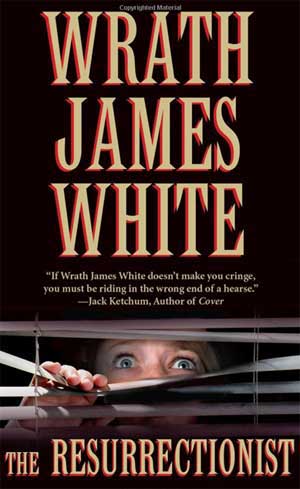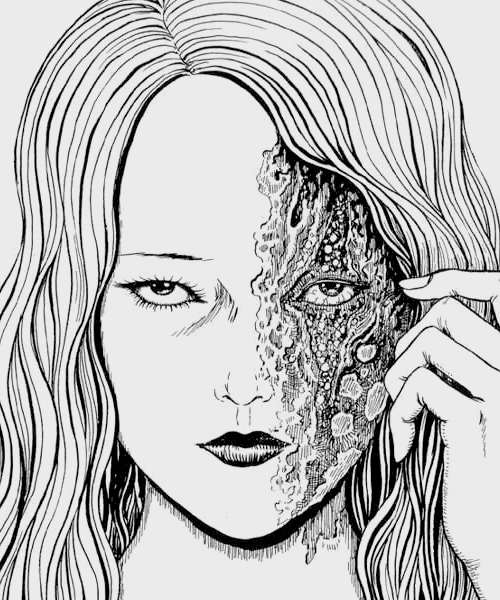 When I read the blog of “Wrath” James White, MMA fighter turned horror author, he struck me as an intelligent and perceptive person with a lot to say. His books received acclaim on Amazon. I rolled the dice: got “The Resurrectionist”, read it, and arrived at a verdict: this book sucks ass.
When I read the blog of “Wrath” James White, MMA fighter turned horror author, he struck me as an intelligent and perceptive person with a lot to say. His books received acclaim on Amazon. I rolled the dice: got “The Resurrectionist”, read it, and arrived at a verdict: this book sucks ass.
The premise: Dale McCarthy has the power to bring dead people back to life. The revived dead have no memory of their deaths. Unfortunately, he is no Peter Parker, and he does not use his powers for good. He moves in next door to Sarah and Josh Lincoln, takes a liking to the lady of the house, and night after night breaks in, rapes Sarah, kills both of them, and then brings them back from the dead, neither of them any the wiser. Actually, that’s not true. Sarah has some vague awareness of what is happening to her…but how can you arrest a murderer who leaves no corpses behind?
Wrath writes (to misquote Roger Ebert) like a man chopping firewood. This happens. Then that happens. His prose is dull and workmanlike, as is his tendency to grab the most obvious metaphor off the clearance rack (“…her perfect porcelain doll face”). If you want a horror story that’s evocative, this is not it. The Resurrectionist has all the emotional punch of reading a novel’s plot on Wikipedia.
Wrath has clearly lived quite a full life, and it seems he wants to share some of his experiences with the reader. This is a commendable thing. Getting one’s experiences on to the page is nearly the core of writing. However, The Resurrectionist ends up bogged down in needless scenes where we learn all about how to load and fire a gun, and all the ways you can set up security cameras in your home, and the ins and outs of working as a pit boss, with the story going exactly nowhere.
Atheism is obviously a subject Wrath is passionate about, and a fair bit of that seeps into the book too. There are annoying and contrived scenes where characters are ruminating on the nature of evil, a Christian character chimes in with something about God, and an atheist character delivers the kind of perfect smackdown that only happens when you write it in a novel.
What’s with all the weird sexual crap? It’s like every few pages we get reminded of how firm and perky the heroine’s breasts are, or how well-toned her ass is. This kind of thing cheapens the book. The Resurrectionist should be horrifying. Instead it comes across as a sleazy horror movie, starring a Scream Queen who makes sure to trip so we get a good look at her panties.
With all this pointless mental detritus padding out The Resurrectionist, we end up with a 200 page story hiding out somewhere in a 300 page book. Combined with the poor writing and the result is a long-winded and heavily padded book where you can’t even relax and enjoy the journey. To be fair to Wrath, it’s not a complete borefest. He knows how to turn on the afterburners. The final section is furious, gory, and intense.
But at the end of the day, The Resurrectionist is ineffective at most of what it sets out to do. I didn’t like any of the characters. The plot is predictable. The atmosphere is thin enough to star in a UNICEF commercial. Everything about the book seems thoughtless and slapped together.
One detail seems to sum up the carelessness of The Resurrectionist. Wrath establishes Josh Lincoln as an affable down to earth every day man. He apparently lifts weights for twenty minutes a day, “just to stay in shape”. Later, we’re told that Josh has a 500 pound bench press and a 700 pound squat. Those are the numbers of an elite powerlifter who trains for hours a day and sticks needles in his ass. It seems completely implausible that such a fantastically strong man would be repeatedly subdued and killed by Dale, who is described as small, weak, and sickly.
Whatever…I don’t know. Apparently this is Wrath’s second book so I’ll assume he’s gotten much better since this.
 The 80s were a time of great songs and inconsistent albums. Songs like “Nothin’ but a Good Time” and “Youth Gone Wild” are anthems of the age…of all the ages. But when I actually sit down and listen to a Poison or Skid Row album in its entirety, I go skip… listen… skip… skip… listen… skip… skip… skip… listen…
The 80s were a time of great songs and inconsistent albums. Songs like “Nothin’ but a Good Time” and “Youth Gone Wild” are anthems of the age…of all the ages. But when I actually sit down and listen to a Poison or Skid Row album in its entirety, I go skip… listen… skip… skip… listen… skip… skip… skip… listen…
The good news: Dr Feelgood contains songs called “Dr Feelgood” and “Kickstart My Heart.” These two songs are loaded with energy, great riffs, and massive hooks. Crue does nothing but kill on both of these tracks.
The bad news: Dr Feelgood contains nine songs that aren’t “Dr Feelgood” and “Kickstart my Heart.” I can’t remember too much about them. I think “She Goes Down” sounded a little like Aerosmith. Motley Crue sounds completely out to lunch on these songs, they’re just not that memorable or interesting. They kind of sit there, like heavy metal elevator music.
There’s a few ballads, too. Someday you might find yourself answering the $500,000 question on Who Wants to Be a Millionaire: What is the most pleasurable out of these experiences? A) a firehose enema. B) getting your nutsack caught in a particle accelerator. C) a rhinocerous-administered prostate exam. D) a Motley Crue ballad. That’s a tough one. You might run out of time. I’d suggest calling a friend.
Sadly, this was an all too typical scenario in the 80s, where rockstars would turn out one or two really good songs, fool around for forty minutes, and snort the rest of the album advance straight up their nose. Motley Crue compensated a little by making their good songs REALLY good (lots of bands ditched the “good” and went straight to “commercial”) but you still can see a neglect for the album format.
They did this on the album before this, too. “Wild Side” and “Girls Girls Girls” will stay with me forever. The rest of the album doesn’t even exist so far as I’m concerned.
Were they to blame? I don’t think so. They are a band that catered for a certain audience, and that audience likely didn’t listen to vinyl records front to back and memorise every note. I posit that the average Crue fan circa 1990 knew only the big MTV hits. It doesn’t help that glam was one of the most overtly image-focused styles of music ever to exist. It was curiously like rap in that regard. Nevermind the music, playa. Tell me about all the gunshot wounds you got and all the blow you muled.
Anyway, Dr Feelgood has two amazing Crue classics and nine pieces of filler so unambiguous that you could stuff them inside your walls and save money on your heating bills.
 If you enjoy Junji Ito as an ideas man and a visionary, Black Paradox will appeal to you. If your tastes lean more towards The Twilight Zone than The Human Centipede, you’ll enjoy Black Paradox. But you want a cohesive, effective story, Black Paradox comes up a little short.
If you enjoy Junji Ito as an ideas man and a visionary, Black Paradox will appeal to you. If your tastes lean more towards The Twilight Zone than The Human Centipede, you’ll enjoy Black Paradox. But you want a cohesive, effective story, Black Paradox comes up a little short.
After his recent forays into non-horror (Cat Diary, The Patriot Rasputin, even parts of New Voices in the Dark), it’s easy to suspect that Junji is getting bored drawing vampire bats and stitched-together corpses. That trend is continued by Black Paradox. Next to the lurching sickness of Gyo, the Mach 10 sci fi carnage of Hellstar Remina, and the gruesome Lovecraftian hellfuck of Uzumaki, Black Paradox dials the intensity way, way down.
Still, maybe that’s not bad. A new, less campy Junji Ito, relying on weirdness and surreality and psychological scares…sounds like we have a date! So what goes wrong?
Basically, Black Paradox showcases a chaotic, out-of-control, self-indulgent plot. Ito has a complete inability to develop any of his own ideas properly.
This manga is the story of four troubled people who have formed a suicide pact, and their adventures in and beyond this world. The first chapter is a horrific traffic collision of various random horror tropes (dopplegangers, evil robots, haunted mirrors…). It’s like Junji had ten ideas for a story and tried to write them all at once. If I was one of these people I’d kill myself just to make my life simpler.
Starting from chapter 2, things get a bit more coherent. One of the characters swallows some sleeping pills, is revived after a near-death experience, and grows a portal to another world in his lower stomach (or something). The other world is full of beautiful gemstones, and the other characters put their suicide plans on hold to harvest, sell and market the stones. But things soon get out of hand when it’s discovered that the stones are extremely dangerous, and the suicide group must go into hiding when they’re suspected of distributing terrorist weapons.
To enjoy Black Paradox’s story you basically can’t think at all about what you’re reading. There’s any number of things that just don’t make sense (that character who is chained to a bed for a month against her will…why? What did she do?) and sometimes Junji breaks his own rules (other characters start developing portals, even though they never swallowed sleeping pills).
I did think the characters were better than in most Junji Ito stories. Marisol is boring manga heroine #1428905 …but then we have the scheming, double-timing Doctor Suka and the morose, byronic Piitan.
There’s a really solid set of ideas powering Black Paradox, and the final chapter does earn its desired emotional response. I enjoyed the allegorical riffs on how willingly humans will screw themselves for short-term comforts. But the central thematic material is put to such bizarre, senseless use in Black Paradox. It’s like having strong, sturdy wooden boxes that you use to catalogue your booger collection.
Black Paradox also contains two bonus stories. “The Licking Woman” is a nice piece of mayhem, featuring demon-possessed tongues and plot holes, and “The Mystery Pavilion” is so short it doesn’t even have an opportunity to suck.
 When I read the blog of “Wrath” James White, MMA fighter turned horror author, he struck me as an intelligent and perceptive person with a lot to say. His books received acclaim on Amazon. I rolled the dice: got “The Resurrectionist”, read it, and arrived at a verdict: this book sucks ass.
When I read the blog of “Wrath” James White, MMA fighter turned horror author, he struck me as an intelligent and perceptive person with a lot to say. His books received acclaim on Amazon. I rolled the dice: got “The Resurrectionist”, read it, and arrived at a verdict: this book sucks ass.

